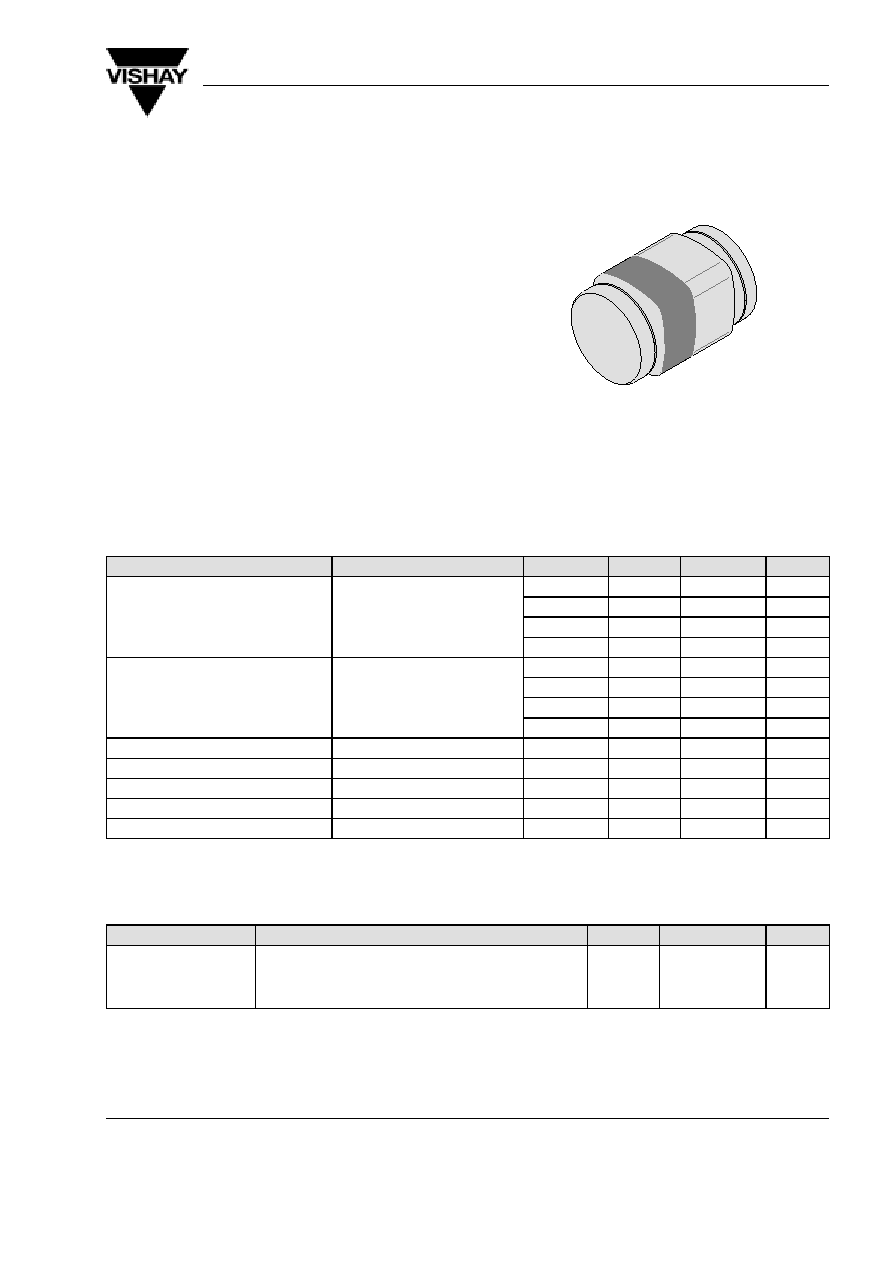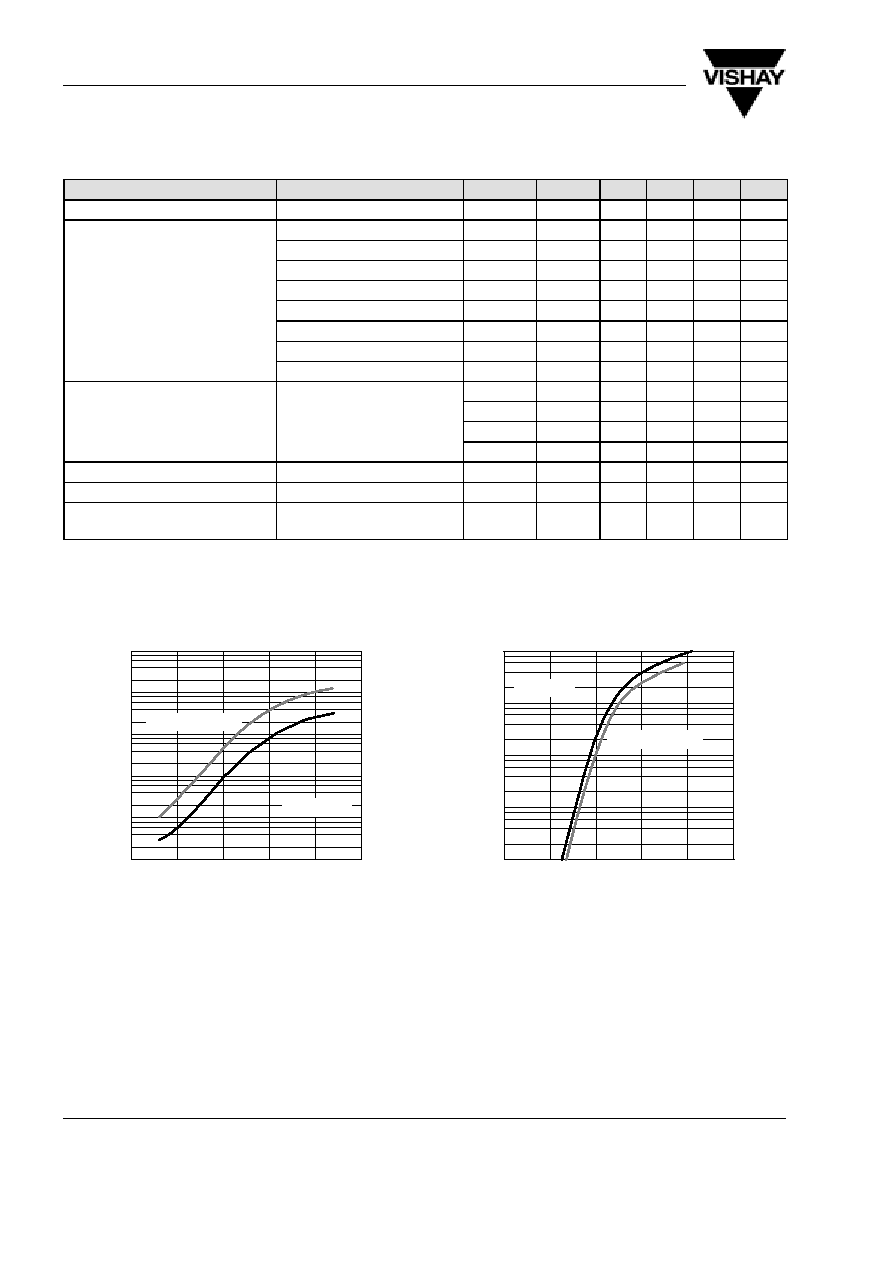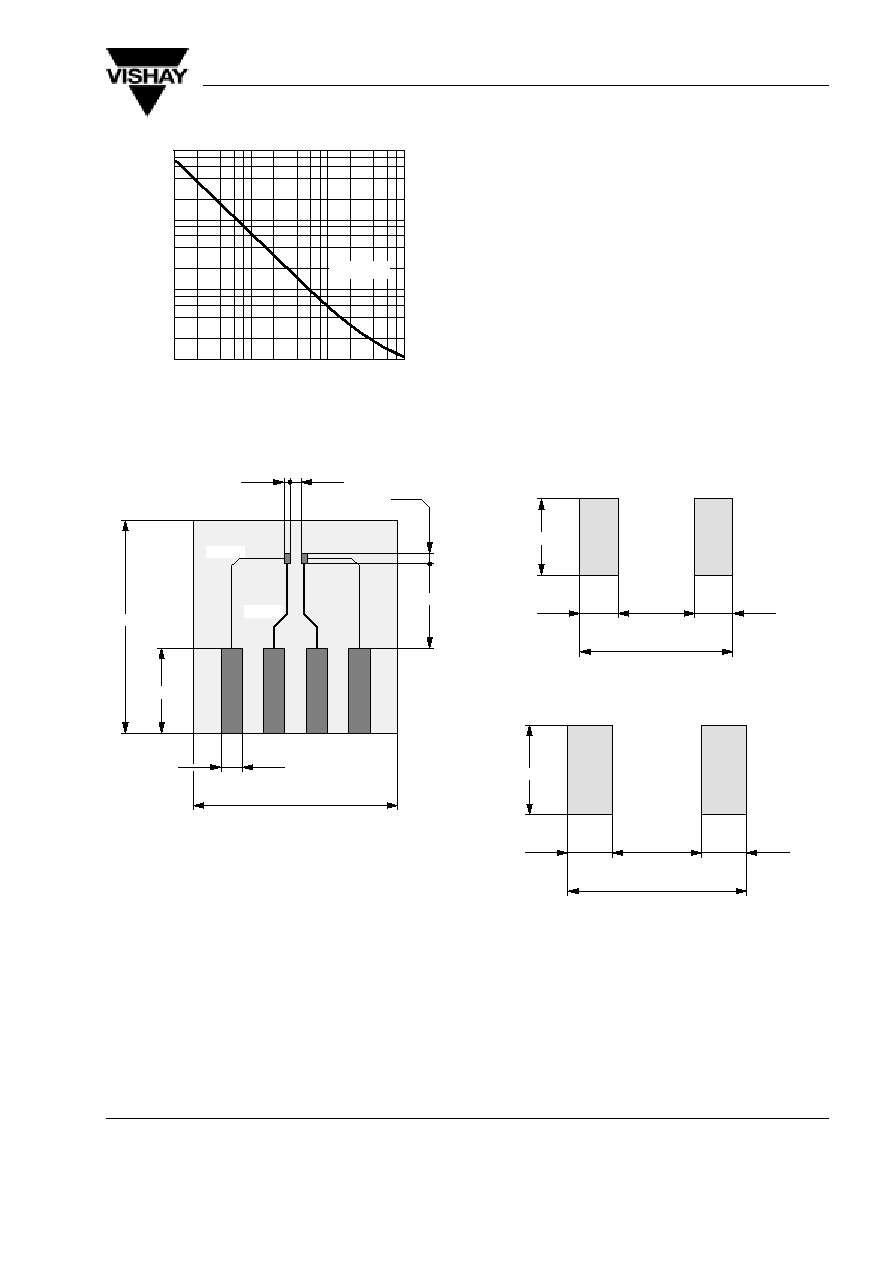
BAV300...BAV303
Vishay Telefunken
Rev. 3, 01-Apr-99
1 (5)
www.vishay.de
∑
FaxBack +1-408-970-5600
Document Number 85545
Silicon Epitaxial Planar Diodes
Features
D
Saving space
D
Hermetic sealed parts
D
Fits onto SOD 323 / SOT 23 footprints
D
Electrical data identical with the devices
BAV100...BAV103 / BAV200...BAV203
Applications
General purposes
96 12315
Absolute Maximum Ratings
T
j
= 25
_
C
Parameter
Test Conditions
Type
Symbol
Value
Unit
Peak reverse voltage
BAV300
V
RRM
60
V
g
BAV301
V
RRM
120
V
BAV302
V
RRM
200
V
BAV303
V
RRM
250
V
Reverse voltage
BAV300
V
R
50
V
g
BAV301
V
R
100
V
BAV302
V
R
150
V
BAV303
V
R
200
V
Forward current
I
F
250
mA
Peak forward surge current
t
p
=1s, T
j
=25
∞
C
I
FSM
1
A
Forward peak current
f=50Hz
I
FM
625
mA
Junction temperature
T
j
175
∞
C
Storage temperature range
T
stg
≠65...+175
∞
C
Maximum Thermal Resistance
T
j
= 25
_
C
Parameter
Test Conditions
Symbol
Value
Unit
Junction ambient
mounted on epoxy≠glass hard tissue, Fig. 1
35
l d 0 9
2
R
thJA
500
K/W
35
m
m copper clad, 0.9 mm
2
copper area per
electrode

BAV300...BAV303
Vishay Telefunken
Rev. 3, 01-Apr-99
2 (5)
www.vishay.de
∑
FaxBack +1-408-970-5600
Document Number 85545
Electrical Characteristics
T
j
= 25
_
C
Parameter
Test Conditions
Type
Symbol
Min
Typ
Max
Unit
Forward voltage
I
F
=100mA
V
F
1
V
Reverse current
V
R
=50V
BAV300
I
R
100
nA
V
R
=100V
BAV301
I
R
100
nA
V
R
=150V
BAV302
I
R
100
nA
V
R
=200V
BAV303
I
R
100
nA
T
j
=100
∞
C, V
R
= 50V
BAV300
I
R
15
m
A
T
j
=100
∞
C, V
R
= 100V
BAV301
I
R
15
m
A
T
j
=100
∞
C, V
R
= 150V
BAV302
I
R
15
m
A
T
j
=100
∞
C, V
R
= 200V
BAV303
I
R
15
m
A
Breakdown voltage
I
R
=100
m
A, t
p
/T=0.01,
BAV300
V
(BR)
60
V
g
R
m
t
p
=0.3ms
BAV301
V
(BR)
120
V
BAV302
V
(BR)
200
V
BAV303
V
(BR)
250
V
Diode capacitance
V
R
=0, f=1MHz
C
D
1.5
pF
Differential forward resistance
I
F
=10mA
r
f
5
W
Reverse recovery time
I
F
=I
R
=30mA, i
R
=3mA,
R
L
=100
W
t
rr
50
ns
Characteristics (T
j
= 25
_
C unless otherwise specified)
m
0
40
80
120
160
0.01
0.1
1
10
1000
I ≠ Reverse Current (
A
)
R
T
j
≠ Junction Temperature (
∞
C )
200
94 9084
100
Scattering Limit
V
R
= V
RRM
Figure 1. Reverse Current vs. Junction Temperature
0
0.4
0.8
1.2
1.6
0.1
1
10
100
1000
I ≠ Forward Current ( mA
)
F
V
F
≠ Forward Voltage ( V )
2.0
94 9085
Scattering Limit
T
j
= 25
∞
C
Figure 2. Forward Current vs. Forward Voltage

BAV300...BAV303
Vishay Telefunken
Rev. 3, 01-Apr-99
5 (5)
www.vishay.de
∑
FaxBack +1-408-970-5600
Document Number 85545
Ozone Depleting Substances Policy Statement
It is the policy of Vishay Semiconductor GmbH to
1. Meet all present and future national and international statutory requirements.
2. Regularly and continuously improve the performance of our products, processes, distribution and operating
systems
with respect to their impact on the health and safety of our employees and the public, as well as their impact on
the environment.
It is particular concern to control or eliminate releases of those substances into the atmosphere which are known as
ozone depleting substances ( ODSs ).
The Montreal Protocol ( 1987 ) and its London Amendments ( 1990 ) intend to severely restrict the use of ODSs and
forbid their use within the next ten years. Various national and international initiatives are pressing for an earlier ban
on these substances.
Vishay Semiconductor GmbH has been able to use its policy of continuous improvements to eliminate the use of
ODSs listed in the following documents.
1. Annex A, B and list of transitional substances of the Montreal Protocol and the London Amendments respectively
2 . Class I and II ozone depleting substances in the Clean Air Act Amendments of 1990 by the Environmental
Protection Agency ( EPA ) in the USA
3. Council Decision 88/540/EEC and 91/690/EEC Annex A, B and C ( transitional substances ) respectively.
Vishay Semiconductor GmbH can certify that our semiconductors are not manufactured with ozone depleting
substances and do not contain such substances.
We reserve the right to make changes to improve technical design and may do so without further notice.
Parameters can vary in different applications. All operating parameters must be validated for each customer application
by the customer. Should the buyer use Vishay-Telefunken products for any unintended or unauthorized application, the
buyer shall indemnify Vishay-Telefunken against all claims, costs, damages, and expenses, arising out of, directly or
indirectly, any claim of personal damage, injury or death associated with such unintended or unauthorized use.
Vishay Semiconductor GmbH, P.O.B. 3535, D-74025 Heilbronn, Germany
Telephone: 49 ( 0 ) 7131 67 2831, Fax number: 49 ( 0 ) 7131 67 2423




